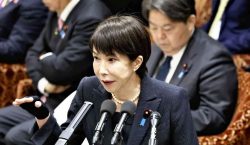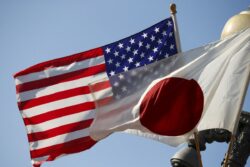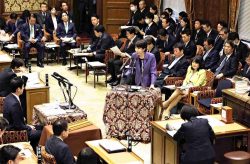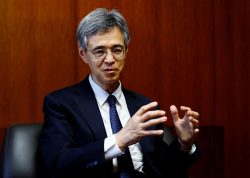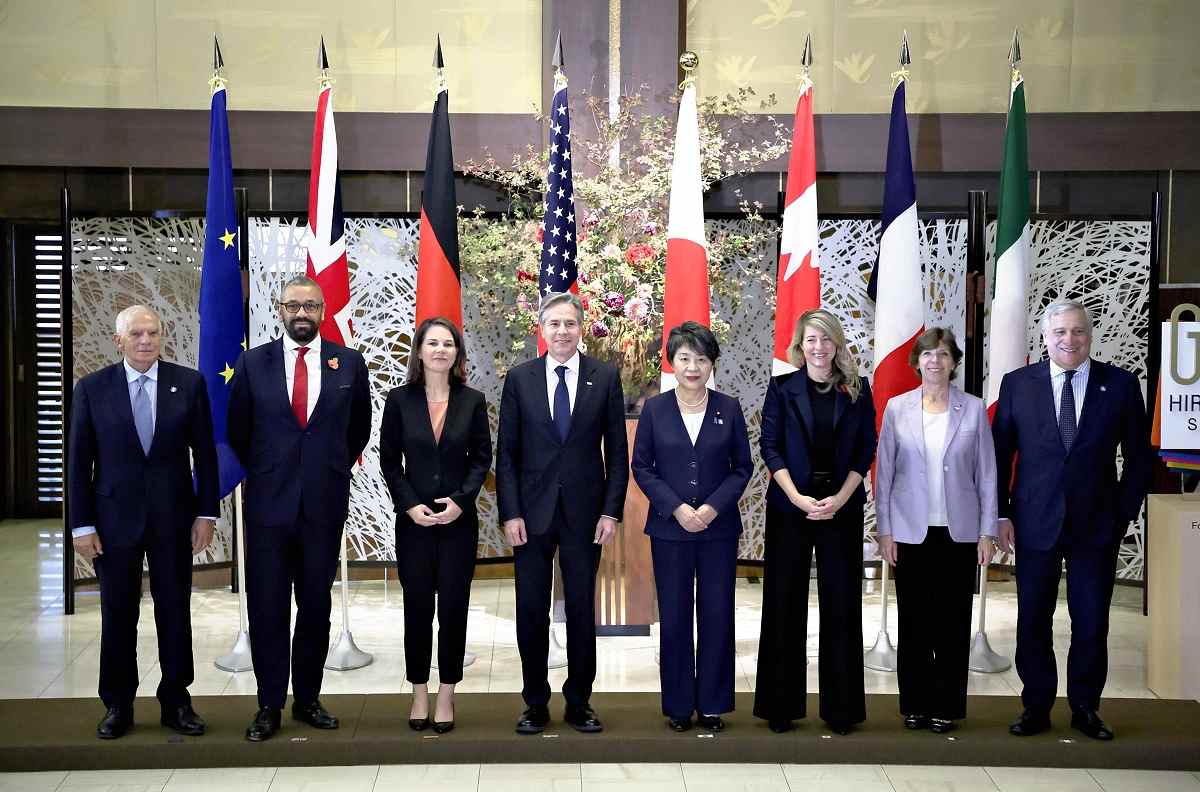
Foreign Minister Yoko Kamikawa, fourth from right, and other G7 foreign ministers pose for a photo at the Iikura Guest House in Minato Ward, Tokyo, on Wednesday afternoon.
16:20 JST, November 9, 2023
It was not always plain sailing, but the foreign ministers of the Group of Seven nations managed to find some points of agreement on the intensifying conflict between Israel and the Islamist group Hamas.
The ministers agreed on the necessity for “pauses” in the fighting for humanitarian reasons and were able to demonstrate unity in dealing with this issue. However, at a time when concrete steps to calm the volatile situation remain elusive, some questions are being asked about the true worth of the G7, which has pledged to uphold the international order.
At a ministers’ working dinner on Tuesday, Japanese Foreign Minister Yoko Kamikawa reminded her counterparts about the importance of exhibiting solidarity. Kamikawa, who chaired the meeting, urged the other ministers to work together as “one team.” The discussion on the Middle East situation became rather heated and lasted for 2 hours 11 minutes — much longer than the scheduled 1 hour 15 minutes. At one point, Kamikawa reportedly had to placate one foreign minister who became very emotional when the talks became increasingly intense on issues including ways to improve the humanitarian situation in Gaza.
Historical reasons and domestic situations are among the factors behind the striking differences of opinion among G7 members on Middle East issues. France, which is home to many Muslim immigrants, voted in favor of an Oct. 27 resolution adopted by the U.N. General Assembly that called for a “humanitarian truce.” However, the United States, an ally of Israel, voted against the resolution, and Japan, the United Kingdom, Germany, Canada and Italy were among the nations that abstained.
The joint statement issued Wednesday by the G7 foreign ministers expresses support for “humanitarian pauses,” so they were in step on this issue — at least on the surface. It is apparently assumed these pauses would involve multiple, brief halts to the fighting to allow humanitarian supplies to be transported into Gaza, among other assistance. The statement condemned Hamas for its Oct. 7 attack on southern Israel — an element absent from the U.N. resolution — and specified Israel has a “right to defend itself and its people.” The statement also called for the “immediate release of all hostages” captured by Hamas fighters during its attack.
“We showed as many points of agreement as we could under the current circumstances, but it would be a stretch to say that all G7 members think the same way about details such as the length of any such pause and under what conditions they could be implemented,” a senior Foreign Ministry official told The Yomiuri Shimbun.
At a press conference after the meeting, U.S. Secretary of State Antony Blinken said Hamas would benefit from a ceasefire being demanded by Arab nations. This comment revealed that opposition was expressed to such a cessation of hostilities even at the G7 meeting.
Cohesion on the line
Japan has from the outset called for a temporary halt to the fighting between Israel and Hamas. This stemmed from a strong sense of concern that failing to take steps to address the humanitarian crisis in Gaza, a self-ruled Palestinian territory that Israel has blockaded, could jeopardize the cohesion of the G7, which has long trumpeted the importance of the “rule of law.”
Japan also has pushed ahead with its own diplomatic efforts to address the issue. On Nov. 3, before the G7 foreign ministers’ meeting, Kamikawa went to Israel and held talks with Israeli Foreign Minister Eli Cohen. Kamikawa urged Israel to allow a pause in the conflict and directly demanded that all parties “act in accordance with international law.”
One attendee at the meeting revealed that Kamikawa did not hold back. “She used such a strong tone that I was worried the Israeli side might fly into a rage,” the source confided.
Even the United States, which opposes a ceasefire in Gaza, has become increasingly concerned about the humanitarian crisis unfolding as the conflict escalates. Anti-Israel demonstrations have spread to many parts of the United States, and this sentiment has started to morph into criticism of the administration of U.S. President Joe Biden. Blinken visited Israel on Nov. 3 and pressed Israeli Prime Minister Benjamin Netanyahu to allow a pause in the conflict. Biden made the same request during a phone call to Netanyahu on Monday.
Path ahead unclear
There is no guarantee the situation will calm down even if the conflict is briefly halted. The path toward having the Israeli and Palestinian states existing together as a mid- to long-term solution to the issue remains unclear.
If the military conflict drags on and the number of casualties in Gaza continues to increase, it is possible that anti-Israel sentiment growing especially in the emerging and developing nations known as the Global South could also target the G7.
At a press conference after the ministers’ meeting, Kamikawa was asked about the role the G7 could play in resolving the situation. “The G7 can deepen cooperation with relevant nations and repeatedly conduct diplomatic efforts,” she replied.
Will the G7 be able to take effective measures as “one team” to deal with the Israel-Gaza issue? Situations in which the group’s role is put to the test likely will increase in the weeks ahead.
Top Articles in Politics
-

Japan PM Takaichi’s Cabinet Resigns en Masse
-

Sanae Takaichi Elected Prime Minister of Japan; Keeps All Cabinet Appointees from Previous Term
-

Japan’s Govt to Submit Road Map for Growth Strategy in March, PM Takaichi to Announce in Upcoming Policy Speech
-

LDP Wins Historic Landslide Victory
-

LDP Wins Landslide Victory, Secures Single-party Majority; Ruling Coalition with JIP Poised to Secure Over 300 seats (UPDATE 1)
JN ACCESS RANKING
-

Producer Behind Pop Group XG Arrested for Cocaine Possession
-

Japan PM Takaichi’s Cabinet Resigns en Masse
-

Man Infected with Measles Reportedly Dined at Restaurant in Tokyo Station
-

Israeli Ambassador to Japan Speaks about Japan’s Role in the Reconstruction of Gaza
-

Videos Plagiarized, Reposted with False Subtitles Claiming ‘Ryukyu Belongs to China’; Anti-China False Information Also Posted in Japan


